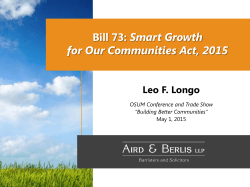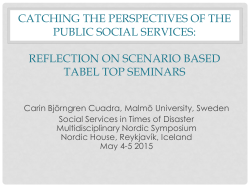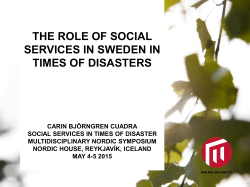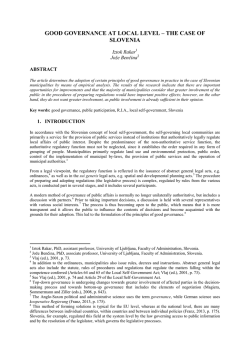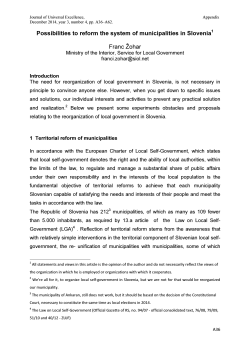
WASTE SERVICES CHALLENGES FACED BY MUNICIPALITIES
MPUMALANGA PROVINCIAL GOVERNMENT WASTE SERVICES CHALLENGES FACED BY MUNICIPALITIES 1 Introduction • Waste Management is administered by different role-players and regulated under various pieces of legislation to protect the environment and human health, • Waste Management is a basic service that require integrated approach, • Participation and involvement of public, private, government and NGO’s to identify solutions to improve waste management services and explore other waste treatment technologies, • Waste Hierarchy : guide the waste management practises, adopted internationally, • Waste as a business sector revenue ( make revenue for waste). Challenges • Low cost recovery and underprizing does not adequately cover the expenditure of waste management services, due to non-payments of services by generators, tariffs not activity based and insufficient revenue collection system, • Prioritization of waste management services as other basic services in terms of planning, designs, development and implementation, • By-laws: Outdated, implementation, enforcement and alignment of Bylaws to NWA, • Community engagement structures to promote environmental awareness ( e.g. littering and illegal dumping) • Waste Management service disparity between urban and rural local municipalities, • Institutional arrangements : waste management services fall within other Departments that does not prioritise waste as a basic service, • Poor operations and management of waste management facilities : noncompliant with environmental legislation ( e.g. non-determination of airspace, cover material, equipment, technical expertise) • Lack of consistence and coordination between local/district municipalities to improve waste management service delivery, • Limited understanding of considering waste as a resource that has a potential to contribute to economic growth ( creating job opportunities) is taken as a nuisance • Limited resources (human, technical skills and financial, equipment and etc) which impact on the integrated waste management services and procurement and financial processes delays, • Rapid change of environmental legislation creates instability of keeping up with the latest development, • Waste management infrastructure aging and maintenance, (no maintenance plans for assets), • No proper implementation of Integrated waste management plans and budget allocation, • The waste tariffs of municipalities are determined through total cost accounting and therefore impacting on the sustainability of the service; • Poor attendance of Waste Management Officer’s forums and trainings/ others not designated the WMO, • Limited resources at provincial level assist with waste management projects (e.g. recycling) and recycling haulage system, • Lack of waste collection, capturing and reporting to Waste Information System ( reliable data, access to information, identify priority waste streams requiring government intervention and raise awareness) • Non-registered and control of waste reclaimers on landfill sites and exposure to illegal hazardous waste disposed on landfill sites due to poor operations and management of the landfill sites. • Prices of recyclables are determined by the potential buyers and landfill sites overloaded with uncollected waste, • Mushrooming of informal housing , extension of Waste Collection to unserviced areas and revenue collection, • Limited Waste Management infrastructure funding, compared to other basic services (Planning and Design capacity mainly for Infrastructure /Technical Services). Recommendations • Organisational Structure: Establish functional units for Waste Management with clear allocation of responsibilities ito environmental legislation and enforcement of appropriate by-laws, • Waste Minimization and Recycling initiatives: shift away from disposal and more adopting Waste Hierarchy approach, e.g waste to energy projects • Registration and reporting to waste information system (WIS), research and development initiatives, training and awareness programmes, etc • Creation of conducive economic conditions to enable implementation of IWMP’s and allow private investment on waste management facilities, • Intergovernmental co-operation with regards to waste management, • Common planning, implementation and reporting framework for municipalities, • Set up community engagement structures: to promote environmental awareness, • Provincial Departments to support waste minimization initiatives, and each province to establish all waste stream processing plant to minimise haulage distance for potential reclaimers, • Integrated waste management infrastructure needs to be assessed and costed; • Refresher courses on integrated waste management to be implemented at tertiary institutions to improve skills and the capacity of municipal waste managers. • A dedicated Municipal Infrastructure Grant fund for waste management is needed as such; • The service delivery mechanism of municipalities will have to relook at to get more private sector involvement and alternative funding for municipal waste management services; • Funds collected from the waste pricing should go directly to municipalities to fund integrated waste management infrastructure, • The use of rail to transport waste and recyclables should be investigated and implemented; • Regionalisation of waste management services as a solution to make waste management more affordable should be implemented; • Waste Management services to be prioritised and appointment of skilled, technical and committed personnel; • The three spheres of government campaigns should be establish to raise awareness to communities and political leaders on waste management issues and be prioritised; • Formalization of rural areas, effective implementation of SDP, EMF , Township Planning and etc, • Integrated Planning Forums within each municipality to optimise planning, design, license and authorisation costs, led by Planning Cluster • Registration of informal reclaimers should be prioritised to improve waste diversion and to create sustainable jobs and entrepreneurs. THANK YOU
© Copyright 2025



